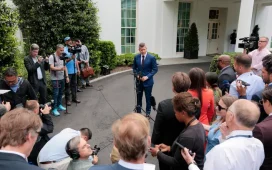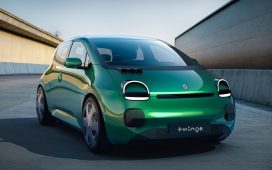Donald Trump has kept the world on edge in his second term as the US president. Tariffs are just one part of his agenda, but that alone has already triggered market upheavals and threatens the very foundations of global trade.
Export-dependent countries like Germany — and especially its automotive industry — are feeling the pressure.
Around 3.4 million passenger vehicles were exported from Germany in 2024, with the United States being the largest single market, according to data compiled by the German statistics office, Destatis.
The president of Germany’s ifo economic think tank, Clemens Fuest, told Reuters this was why higher levies on automobile imports to the US would affect “Germany’s most important export good.”
“That alone is a significant burden on the German economy,” he said.
Many European auto makers, including Germany’s Mercedes, have suspended or cut full-year financial guidance, partially attributing their move to Trump’s trade tariffs.
“Assuming current trade policies persist, [earnings before interest and taxes] and free cash flow of the industrial business, as well as the adjusted returns on sales of Mercedes-Benz Cars and Mercedes-Benz Vans, will be negatively impacted,” the company said in a statement.
Stockpiling cars
An unusual trend has emerged in the global auto industry since Donald Trump unveiled his plans to tariff imported cars: More vehicles are being produced and shipped to the US than before.
For Ferdinand Dudenhöffer, director of the Center Automotive Research (CAR) in Bochum, Germany, carmakers have resorted to the strategy of “stockpiling exports” to beat higher duties at least for a few months.
They are “restocking their inventories in the US,” he told DW, under attempts to import as many vehicles as possible, which resulted in a “short-term counter-cyclical production surge.”
Stefan Bratzel, director of the Bergisch-Gladbach, Germany-based Center of Automotive Management (CAM), shares that view, and said that German carmakers had shipped “as many vehicles to the US as possible” before the tariffs kicked in.
“In the end, prices will have to go up. Demand in the US will fall as a result, and so will revenue and profits,” he told DW.
Reason for hope out of London
What politicians and economists fear most is the unpredictability of Trump’s trade policies.
However, the US president has also shown a degree of flexibility in his attempts to strike trade deals. The most recent examples have been provisional agreements with the UK and China in which he lowered tariffs for certain periods.
The UK government in London has been able to reduce the tariffs by 10% on up to 100,000 British cars — roughly the number of vehicles the UK exported to the US last year. Any vehicles beyond that quota would be subject to a 27.5% import duty.
Complicated as it may be, Trump also promised that engines and aircraft parts of UK aerospace manufacturer Rolls-Royce could be exported to the US duty-free. But, as the BBC also reported, that part of the deal is far from finalized as it would require approval by the US Congress, which has a say in deciding long-term US trade agreements.
Poison for business
Trump’s erratic trade and economic policies are difficult to cope with, accoring to the experts interviewed by DW.
“Flexibility is key,” when confronted with Trump’s policies, said Bratzel, adding, however, that the constant uncertainty would be “poison for manufacturers and suppliers who need to plan long-term and coordinate complex supply chains.”
Dirk Dohse of the Kiel Institute for the World Economy (IfW) in Germany also sees uncertainty as a major issue for European carmakers, who are also grappling with other challenges. High production costs and a lack of “attractive models, especially in the field of electric mobility,” he told DW, had caused a “loss of competitiveness against Chinese rivals.”
To avoid high tariffs in the long run, some German carmakers are considering moving production to the US, Dohse said, and mentioned premium carmaker Audi as an example, which is “exploring the idea” of building a plant there. “Looking ahead, a joint Audi-Porsche plant in the US could also be an option,” he added.
Global division of labor at risk
But investing in the US is no silver bullet as car production in America still requires imported parts, and that goes for American companies too. Many components in “American” cars are sourced from abroad, which makes the experts wonder if the concept of global industrial “division of labor” isn’t understood by the Trump administration.
“Trump doesn’t really understand the concept or the benefits of international division of labor,” said Bratzel, adding that Trump’s so-called America First agenda could do “serious damage to US prosperity” in the end.
US carmaker Ford Motor suspended its annual guidance earlier this month because of uncertainty around Trump’s tariffs. It said the levies would cost the company about $1.5 billion (€1.3 billion) in adjusted earnings before interest and taxes.
“It’s still too early to fully understand our competitors’ responses to these tariffs,” Ford CEO Jim Farley told analysts. “It’s clear, however, that in this new environment, automakers with the largest US footprint will have a big advantage.”
Exploring new markets
Given the upheaval caused by Trump’s trade policy, German carmakers need new strategies.
Dudenhöffer advises restraint, opting for a “wait and see” approach that “doesn’t react just yet.” Because the situation is more uncertain than ever, he suggested focusing future investments in Asia instead.
“The most important consequence is greater geographic diversification of production,” echoed Dohse. “Companies should expand their manufacturing across more countries to be less dependent on the trade rules of any one nation.”
Bratzel cited the principle of “build where you sell” — meaning manufacturing in the markets where the vehicles are sold. He said the trend is already underway, with “more and more value creation being shifted to the regions where the vehicles are marketed.”
This article was originally written in German.










